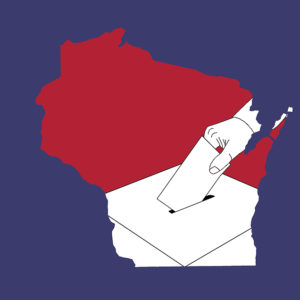The Trump campaign has not withdrawn its suit challenging the Wisconsin election, and it is hoping the U.S. Supreme Court will take up the case under a doctrine sometimes used in similar cases to prevent a case from being declared ‘moot’ because an event has passed.
William Bock III, the Indianapolis attorney representing President Donald Trump in the case against the Wisconsin Elections Commission and other defendants, says he is expecting the court will consider whether to take the case under the doctrine of ‘capable of repetition but evading review.’
The purpose of applying the doctrine in this case, Bock said, would be “so that the courts can take a look at issues that might come up in future elections.” He says he is not expecting that the Wisconsin election result, which showed Biden winning by a margin of 20,682 votes, to be thrown out.
Interestingly, the Wisconsin suit has nothing to do with voting machines or with election observers not being allowed to observe the counting of ballots. And it doesn’t actually allege voter fraud.
Rather, the suit appeals the Dec. 24 decision of the Seventh Circuit Court of Appeals and alleges violations of Article II of the U.S. Constitution, which gives state legislatures the power to choose electors, and to therefore determine all procedures by which votes are cast and counted.
The Wisconsin Elections Commission, the suit says, “implemented absentee voting procedures directly contrary to precisely drawn provisions in the Wisconsin Election Code meant to limit and ‘carefully regulate’ absentee voting.”
The suit focuses on drop boxes, which it says are not authorized by Wisconsin law, saying five Democrat mayors in the state coordinated to illegally implement drop boxes with funding from the Center for Tech & Civic Life, whose largest financial backer is Facebook CEO Mark Zuckerberg.
They include the mayors of Madison, Milwaukee, Racine, Kenosha and Green Bay, all of whom are named as defendants in the suit.
“CTCL funding not only paid for programs which undermined state election law and allowed municipalities to circumvent clear policies of the legislature, it also injected partisan politics into these illegal practices,” the suit says, adding that the millions of dollars in funding for the drop boxes “deliberately went to five municipalities in which Democrat presidential candidate Hillary Clinton won far more votes than Republican presidential candidate Donald Trump in the 2016 presidential election.”
The Wisconsin Elections Commission, the suit says, sent out emails to local election officials in August endorsing drop boxes.
“WEC lacks authority to prescribe the manner of conducting elections,” the suit says. “Rather, it merely administers and enforces Wisconsin’s election laws.”
Drop boxes, the suit says, “do not remotely satisfy” Wisconsin laws for handling absentee ballots and cites Wisconsin law, which says: “The envelope [containing the absentee ballot] shall be mailed by the elector, or delivered in person, to the municipal clerk issuing the ballot or ballots.”
More than 91,000 ballots were collected from drop boxes in Wisconsin for the Nov. 3 election, and the total number of invalid ballots that were counted in the states amounts to “hundreds of thousands,” the suit alleges.
They’re not necessarily fraudulent ballots, says Bock. But they can’t be counted.
“If the votes are not cast in a manner that is set out in state law by the Wisconsin legislature, then those would be invalid votes,” he says.
Other violations of Wisconsin election law detailed in the suit include the “curing” of absentee ballots by election officials, who were instructed by the Wisconsin Elections Commission to add witness addresses on absentee ballot certifications, and did.
“WEC’s election eve instruction to alter or add addresses on witness certificates was another serious departure from the legislature’s plan to protect against absentee ballot fraud,” the suit says, quoting Wisconsin law. “The certificate is part of the evidentiary basis for a poll inspector’s decision whether to allow a ballot envelope to be opened so that the absentee ballot can be counted. An absentee ballot may be opened only if ‘the inspectors find that the certification has been properly executed.’”
When contacted by InsideSources to respond to the allegations in the suit, a spokesman for the Wisconsin Elections Commission sent a link to a statement on the commission’s website, which says that Wisconsin law “does not prohibit absentee ballot drop boxes,” and adds, “some clerks have used them prior to 2020.”
“When municipal clerks asked WEC for guidance on drop boxes in the summer of 2020 in anticipation of voter demand for them in the November election, WEC provided them with best practices to ensure the security of absentee ballots,” the statement says.
“These best practices were based on advice from the Department of Homeland Security’s Cybersecurity and Infrastructure Security Agency and included information about drop box security and chain of custody procedures for securely emptying the drop boxes on a regular basis. This document was not a directive but gave clerks information to use when considering this option for their jurisdiction.”
J. Christian Adams of the Public Interest Legal Foundation tells InsideSources he believes the lawsuit is on target. “Private parties should not be funding elections. The enormous amount of CTCL money built structural bias into the 2020 election. What is to stop CTCL money from building bias in the future? That’s what the court can still resolve, though I doubt they will. Unfortunately, 2022 may well be a sequel to 2020.”
The Wisconsin Elections Commission includes three members appointed by Democrats – chair Ann Jacobs, vice-chair Mark Thomsen and Julie Glancey — and two appointed by Republicans – Bob Spindell and Dean Knudson.
The commissioners, in addition to the mayors and clerks named in the suit, have until Feb. 3 to respond to the Trump campaign’s petition for certiorari to the Supreme Court.

